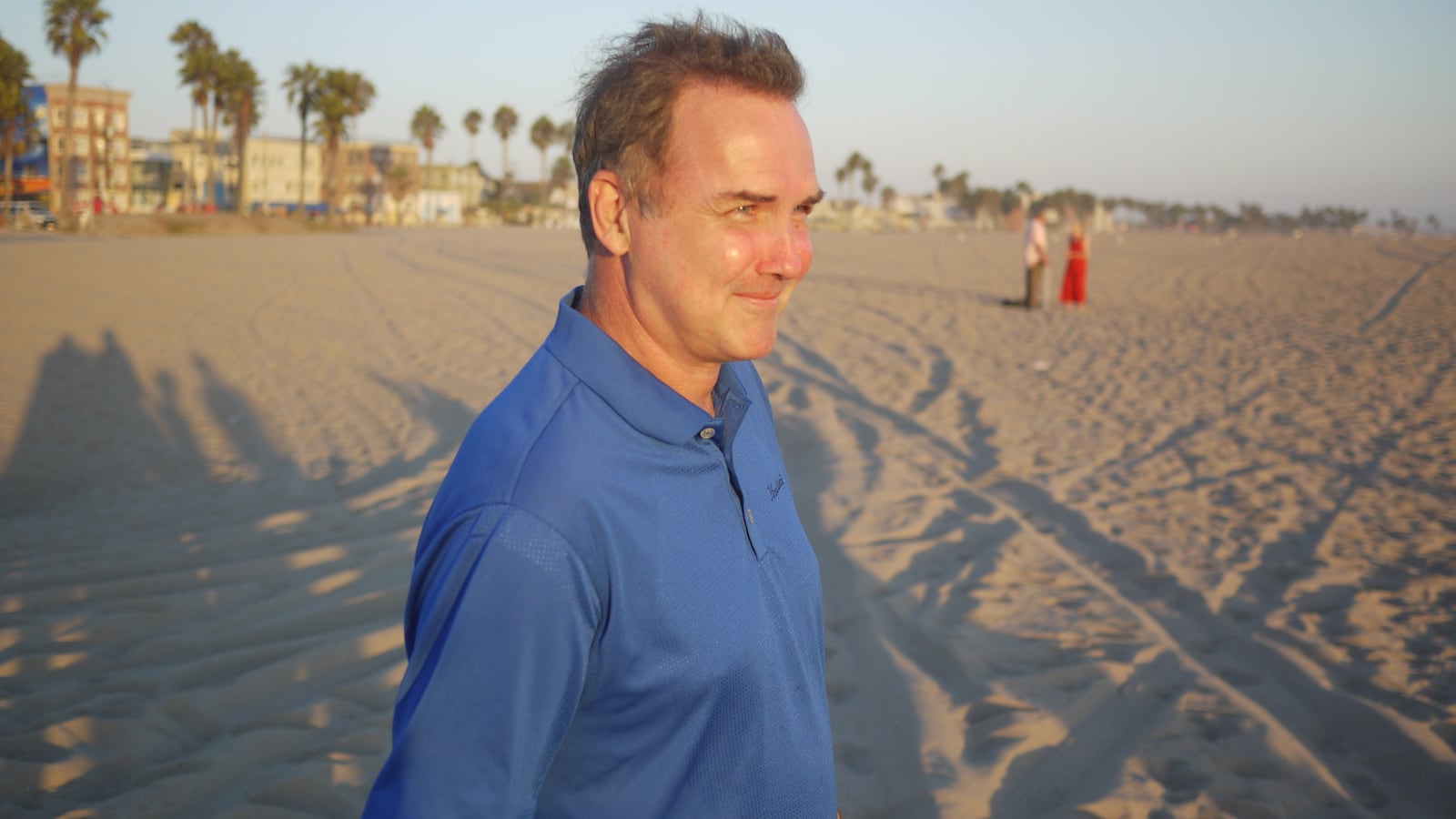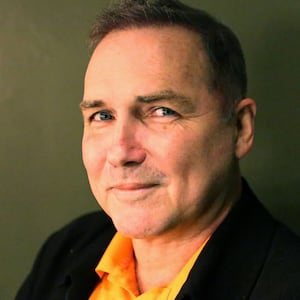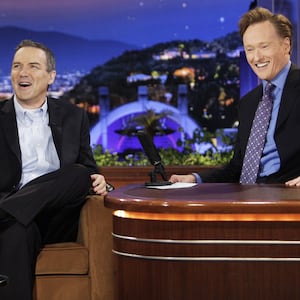We were never supposed to see the posthumous Norm Macdonald special that landed on Netflix this Memorial Day, eight months after the comedian’s premature death from a very private bout with cancer.
In Nothing Special, which was filmed without an audience in the summer of 2020, Macdonald looks more gaunt than he had in recent years. He’s wearing headphones and holding a handheld mic in a nondescript room as he delivers his unfinished material in one long take.
The jokes are punctuated by occasional yaps from an off-screen dog. When his cellphone rings mid-bit, he picks it up. “I’ve got to call you back on account of I’m doing a special,” he says into the phone with a sly smirk on his face.
Behind the camera is Macdonald’s longtime producing partner Lori Jo Hoekstra, who was among the very few people in his life who knew he was dying.
“Norm worked so hard on a new hour of material and wanted it to be seen,” Hoekstra said in a statement about the project. “While this version of Nothing Special was not originally meant to be the final product, COVID restrictions prevented him from filming in front of an audience. We want to make sure his fans see this very funny hour. He left this gift for all of us.”
The hour is very funny at times, and also far less polished than it would have been had Macdonald gotten the chance to fully work it out in front of audiences and then tape it in a proper venue. But the unusual format gives us a glimpse into both his process as a comedian and the state of his mind toward the end of his life.
There is some unexpectedly progressive material about reparations for Native Americans and even the #MeToo movement—especially given the allegations that surfaced following his passing—and long digressions about topics like cannibalism that few other comics could pull off. But there is also a section very early on that mocks the idea of being trans and is sure to alienate some fans in the same way Dave Chappelle and Ricky Gervais have sparked controversy on Netflix in recent months.
That joke, a version of which was also in Macdonald’s set when I saw him perform at the New York Comedy Festival in the fall of 2019, centers on how his father’s outdated views on gender would be perceived today. He sarcastically says he’s only trying to show how “hateful we were back then.” Noting that his dad did “good stuff” like fighting Hitler in World War II, he says he also had an “evil side,” which he describes as “this crazy idea he had that having a cock had something to do with being a boy.”
“Nowadays, we can’t even wrap our heads around that kind of thinking,” he deadpans. “But people used to actually think that way. Isn’t that something?”
From his early days as “Weekend Update” anchor on Saturday Night Live, Macdonald has always been more interested in shocking viewers with his unexpected punchlines on topical issues than he was sharing intimate details about himself, to the point that he wrote an entire “memoir” called Based on a True Story made up of fake anecdotes about his life. Here, he includes jokes about an imaginary wife named “Ruth” and tackles hot-button topics like “systematic racism,” as he puts it, while at the same time mocking the very idea that anyone should be looking to comedians for political opinions.
“When you’re a comedian, they expect you to know things,” he says, a relatively recent phenomenon that he experienced when interviewers—like this one—started asking him to weigh in on politics during the Trump era. He explains that he prefers not to pay close attention to politics “on account of you only get one life.”
Macdonald does, however, start to confront his own mortality when he says he stopped “painting” his hair black because he doesn’t want to “die and be surprised.” He plays out a scenario in which God tells him, “I mean, I made your hair white, what did you think that was all about? I was telling you to get your affairs in order, for God’s sake.”
He describes himself as a Christian, but says one of his “biggest fears” is that he “picked the wrong religion.” Macdonald imagines dying, going to the afterlife and saying, “Ahh, it’s you! I thought it was the other fella. I should have been slaying apostates the entire time. Ah well, what are you gonna do?”
Toward the end of the set, Macdonald frets about making the special too “depressing” before transitioning into some material about what it’s like to write a “living will” and a handful of extremely dark jokes about how eager his own family would be to pull the plug should he ever end up in a coma—without ever acknowledging his cancer directly.
Ultimately, he closes with a surprisingly sweet joke about his mother Ferne, who outlived her son, and was with him in his final moments. Still, it ends with the punchline, “I don’t want to suck her tits!”
After the screen fades to black, viewers are treated to an immediate reaction from six of Macdonald’s closest friends and admirers who gathered together to watch the special earlier this month: David Letterman, Dave Chappelle, Molly Shannon, Conan O’Brien, Adam Sandler, and David Spade.

Norm Macdonald: Nothing Special: David Letterman, Molly Shannon, Dave Chappelle, Conan O’Brien, Adam Sandler, David Spade for Netflix Is a Joke Fest.
Tommaso Boddi/NetflixThey begin by marveling at Macdonald’s ability to hold attention without the presence of an audience. “It’s not strictly stand-up, it’s something else,” an awed Letterman says, adding that the “great gift” would have been to watch Macdonald perform those jokes in front of a crowd.
Sandler shares that, to him, the special felt more like the “gentle Norm” who would hang out on the tour bus after shows. “It looked like he just wanted to get everything out,” he observes, before he no longer had the chance.
“My favorite comedy, it’s counterintuitive, but it makes people feel safe, like everything’s going to be alright,” Chappelle adds. “This guy was, in a weird way, reconciling his mortality, hilariously. And ironically, he’s no longer with us. We’re sitting in the aftermath of Norm Macdonald, watching him be incredibly alive.”
Before long, the comics are reminiscing about the unique experience of being friends with Macdonald, a man who knew how to make them laugh when they were down but became increasingly distant in recent years. As close as some of them were to him, they each reveal that they had no idea how sick he was in the months leading up to his death.
“I thought, maybe I’m the only one who doesn’t know,” O’Brien says at one point. “But he didn’t want anybody to know.” When news of Macdonald’s death broke in the fall of 2021, he says, “We were so upset that we didn’t get a chance to tell him what he meant to us.”
They all agree that Macdonald wouldn’t have “tolerated” that kind of sentimental outpouring of emotional support while he was alive. And yet his final special shows that even within his darkest jokes, there was a man who knew what it meant to love and be loved.
For more, listen and subscribe to The Last Laugh podcast.



